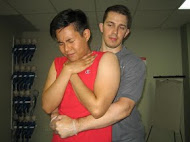The choking of adults or children over age one is a very common incident. Choking occurs when a person cannot breathe properly due to an object blocking the airway, either the throat or the windpipe. These objects can be anything from eating too fast or from vomiting. Choking is either classified as partial or complete of the airway. Partial blockage of the airway occurs when the airway is not blocked completely but causes the victim to not breathe sufficiently. It may easily lead to a medical emergency. On the other hand, complete blockage of airway occurs when an object completely blocks the airway leading to the inability to breathe. Complete blockage is considered a medical emergency. There is danger of permanent brain damage when the brain does not receive sufficient amount of oxygen in as little as four to six minutes. Thus, the importance of knowing first aid for choking of adults or children over age one is an essential first aid skill. In some cases, the object will be lodged in the lung, which can lead to persistent cough, pneumonia or wheezing, even if the victim appears to breathe normally.
Causes of Choking of Adults or Children Over Age One
Choking does not always occur from eating something and swallowing it too quickly. The following may lead to choking of adults or children over age one:
- Eating too quickly, thus failing to chew food properly, or eating with poorly fitted dentures
- Drinking alcohol
- Being unconscious and inhaling vomited specimen
- Inhaling or swallowing small objects, particularly for children
- Face or head injuries, such as bleeding, swelling or deformity
- Aftereffects of a stroke
- Tumors found at the neck and throat
Signs and Symptoms of Choking of Adults or Children Over Age One
Choking of adults or children over age one should be evident, with the individual grabbing the throat with a hand. The other signs and symptoms of choking will include:
- Bluish color of the skin
- Difficulty breathing
- Unable to speak
- During inspiration, produces high-pitched sounds
- Noisy breathing
- Weak coughs
- If blockage is not cleared, loss of consciousness
First Aid Management for Choking of Adults or Children Over Age One
If the individual choking is coughing forcefully and is able to speak, do not administer first aid as the strong cough can clear the throat. In other cases of choking, perform the Heimlich maneuver:
- Stand behind the individual and wrap own arms around the waist of the person.
Performing Heimlich maneuver is generally recommended for choking of adults or children over age one - Using one hand, make a fist, with the thumb side of the fist above the victim’s navel and well below the breastbone. Use the second hand to grasp the first hand.
- Perform quick, upward and inward thrusts with the fist.
- Continue performing thrusts until the object is dislodged or until the victim becomes unconscious.
- If the victim becomes unconscious, lower the person to the floor and if another person is present, ask them to call for emergency medical services.
- Perform CPR.
To learn how to properly administer first aid in choking of adults or children over age one, enroll in First Aid Courses with CPR Training.
Online Sources:

